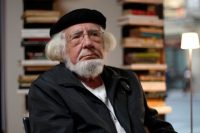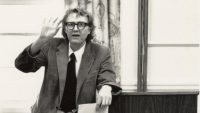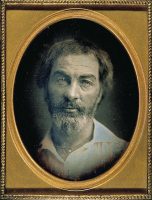February 24, 2017
Edited by David Sanders
Specimen Days
1873—Muhammad Iqbal, Dutch East Indies lawyer/poet/philosopher, is born.
1892—Edna St Vincent Millay, poet/dramatist/feminist (Harp Weaver-Pulitzer Prize), born in Rockland, Maine (d. 1950), is born.
1896—Paul Van Ostaijen, Flemish poet/writer/critic, is born.
1900—Giorgios Seferis, Greece, poet (Nobel 1963), is born.
1925—Nina David, [Mrs Radcliffe N Salomon], poet/author, dies.
1939—Antonio Machado, Spanish poet (b. 1875), dies.
1982—Josh Malihabadi, Urdu poet of India and Pakistan (b. 1898), dies.
1985—Salvador Espriu, Spanish poet (b. 1913), dies.
2006—Hilde Domin [Hilde Palm], German writer and poet, dies at 96.
2014—Leo Vroman, Dutch-American hematologist & Poet, dies at 98.

Wild Swans
I looked in my heart while the wild swans went over.
And what did I see I had not seen before?
Only a question less or a question more:
Nothing to match the flight of wild birds flying.
Tiresome heart, forever living and dying,
House without air, I leave you and lock your door.
Wild swans, come over the town, come over
The town again, trailing your legs and crying!
—Edna St. Vincent Millay
“I looked in my heart while the wild swans went over.” – Edna St. Vincent Millay
World Poetry
In Solidarity with Nicaraguan Poet Ernesto Cardenal

On 12 Febuary 2017, a Nicaraguan court resumed a legal case against the poet and priest Ernesto Cardenal. He was notified last week via a judicial edit that was published in the state newspaper that he must pay $ 800, 000 USD as “damages” in relation to a dispute related to land located on Solentimane Island, where the poet founded a community of artists and created his famous work The Gospel of Solentiname. 92-year-old Cardenal has described this case as “political persecution”.
German Comedian Is Told Not to Repeat Lewd Lines About Erdogan

Jan Böhmermann, a German television comedian whose lewd poem satirizing Turkey’s president stirred tensions between the countries and a furor over freedom of expression, is back on the air and will not face criminal charges. But he is still forbidden from publicly repeating most of the poem, which made provocative — and, his critics say, outrageous — insinuations about the sexuality, behavior and intelligence of Turkey’s president, Recep Tayyip Erdogan. On Friday, a civil court in Hamburg, upholding a ruling from May, barred Mr. Böhmermann from repeating 18 of the 24 lines from the poem.
Jan Böhmermann, a German television comedian whose lewd poem satirizing Turkey’s president, is back on the air and will not face criminal charges.
Recent Reviews
Bill Knott's Unclassifiable Poetry Is Collected in 'I Am Flying Into Myself'
by Craig Teicher

My favorite poem by the late Bill Knott (1940-2014), one of contemporary American poetry’s most brilliant, unclassifiable and impossible figures, is not included in “I Am Flying Into Myself,” the new book that culls from and attempts to organize the unruly literary legacy Knott left behind him. This unruliness was very much self-created. Knott, who was an orphan and spent some time in a mental institution as a teen, published his first book, “The Naomi Poems,” in 1968 under the pseudonym of St. Geraud, whom the flap copy claimed was dead.
Poet Miguel González-Gerth New Collection Spans his Long Career
by Roberto Bonazzi
Poet Miguel González-Gerth, now 90, has written in traditional forms and in free verse. While his strong formal poems never fall heavily on their rhymed endings, the free verse lyrics tend to be even stronger. He writes in English, as well as in his native Spanish, often translating his poems to the other language. Born in Mexico City, the poet has lived most of adulthood in the United States, including many decades as a professor of Spanish and Portuguese at the University of Texas at Austin, as well as editing the Texas Quarterly.
A Herring Famine by Adam O’Riordan Review – Poems of Craft and Guile
A promising poet’s second collection delivers work full of subtle music that wears its heart on its sleeve
by Ben Wilkinson
Paradox is one of the cornerstones of poetry. Emotion jostles with meticulous craftiness, approaching complexity and formal pattern with a deceptive ease and rebelliousness. A poem might comfort, flatter or deceive just as readily as it offers an unflinching truth. It depends on tension as an arrow does its quivering bowstring, going nowhere fast without it. Adam O’Riordan’s first collection, In the Flesh (2010), demonstrated many of these qualities. Its best poems were those with a metaphysical cast of mind: “NGC3949”, named after a galaxy in Ursa Major that mirrors our own, connects with another case of cosmic mistaken identity, spotting “a lover’s shape” in a crowded bar. In poems of poised lyricism, the book revealed an obsession with the line between beauty and violence, but also a fear of erasure, finding consolation in poetry’s potential to commemorate and commit to memory.
A Range of Alter Egos and a Lifetime of Poetic Guises
by Stephen Burt
Poets who do not know Stanley Moss’s own poetry often know him as a publisher. Since 1977 he has presided over Sheep Meadow Press, whose very serious roster mixes new American poets with world-famous modernists in English translation. Collectors also know him as an art dealer. He has said that he started out with “no money or training,” but with a “gift for finding old masters.” “Almost Complete Poems” is Moss’s latest and longest attempt to establish his gifts as a poet. They are real, and they reflect his life and talents — his quest for spiritual strength, his Jewish heritage, his eye on Europe and European art, and his 91 years.
Bill Knott’s unclassifiable poetry is collected in “I Am Flying Into Myself.”
Broadsides
Burns Night: The Battle over Scottish Identity Continues
by Annalena McAfee
Poetry makes nothing happen, Auden wrote. It does, however, provide an excellent excuse for a late-January bacchanal. The annual Burns Night supper, marking the birth of Scotland’s national poet, reprises the excesses of Christmas and New Year’s Eve, with a ritualistic meal, strong drink and verse recitations standing in for carols. Accessorised in tartan, in pubs, clubs and private homes throughout the UK, revellers raise glasses to the immortal memory, musically recall “Auld Lang Syne” and, in robust rhyming Scots vernacular, praise haggis then spear, eviscerate and serve it.
Cy Twombly, the Postmodern Painter
by Marjorie Perloff
Cy Twombly’s “writing” – the gestural scratching, clotting and smearing that is this noted postmodern painter’s trademark – is, as Roland Barthes put it in a much cited essay of 1979, “decipherable, but not interpretable; the strokes themselves may well be specific, discontinuous; even so, their function is to restore . . . the vague which paradoxically excludes any notion of the enigmatic”.
The 2017 Stephen Spender Prize – A Callout for Poetry Translators
by Margaret Jull Costa
I was thrilled to be invited to be one of the judges on the Stephen Spender prize for poetry in translation alongside Sean O’Brien and Olivia McCannon. Thinking about the generosity of the competition itself – which invites submissions from translators of any age, translating any poem from any language – triggered memories of my first proper encounters with translated fiction, when, as an 11-year-old, I was issued with a ticket to the local library. I still remember the delightfully bookish smell and the sound of the date stamp kerthumping down on my chosen book.
Poetry makes nothing happen, Auden wrote.
Drafts & Fragments
75 Years after Japanese Internment: Poetry Tradition Ripped Away from Yakima Valley along with Creators
by Tammy Ayer
Eight Japanese men gathered at the Tamagawa Tei restaurant on First Street in downtown Yakima to recite their poems and judge the others. On this fall day in 1912, members of the Yakima Ameikai — Yakima Croaking Society — met for the first time.
All seasonal farm workers, they wanted something more than just gambling, smoking and drinking sake during their time away from work in the fields. They wanted companionship and culture. They wanted to express their feelings in a way that each could understand and appreciate.
Everything I Know About Sex I Learned From Edna St. Vincent Millay
by April Smith
It was love at the very first line. I got off the bus in a strange neighborhood, a winter afternoon and already dark. It was after school and I was visiting my friend, Carolyn, to beg for help with math, at which I was hopeless. While taking off my coat in her bedroom, I spotted a thin paperback in the light on the nightstand, The Collected Sonnets of Edna St. Vincent Millay.
Yakima Ameikai, or The Yakima Croaking Society, met for the first time in 1912.
Poetry In the News
Politics and Poetry Reign at NY Fashion Week
There's bad Fashion Week weather, and there's REALLY bad Fashion Week weather. Fashion lovers had to be careful not to slip and break major bones Sunday as they maneuvered along slippery, slushy streets. Inside the shows, there was plenty of talk about politics, social change, and womanhood. There were even some soulful poetry readings.
In a Walt Whitman Novel, Lost for 165 Years, Clues to ‘Leaves of Grass’

Readers who picked up The New York Times on March 13, 1852, might have seen a small advertisement on Page 3 for a serial tale set to begin the next day in a rival newspaper. “A RICH REVELATION,” the ad began, teasing a rollicking story touching on “the Manners and Morals of Boarding Houses, some Scenes from Church History, Operations in Wall-st.,” and “graphic Sketches of Men and Women” (presented, fear not, with “explanations necessary to properly understand what it is all about”).
Bill And Hillary Clinton Honor Maya Angelou: ‘We Are All In Her Debt’
President Bill Clinton and former Secretary of State Hillary Clinton were in Harlem, New York on Thursday to honor the legendary Dr. Maya Angelou days before the release of a new documentary on the late poet’s life and legacy. The Clintons spoke onstage at The Schomburg Center for Research in Black Culture, which was recently designated a national historic museum, at an event celebrating release of the documentary, “American Masters ― Maya Angelou: And Still I Rise.”
A lost Walt Whitman novel has been found.
New Books
Common Ancestor by Jenny Irish
[Paperback] Black Lawrence Press, 65 pp., $15.95

"Extreme intimacy paired simultaneously with objective distance—it is an odd, almost impossible, but compelling juxtaposition of feelings and revelations that we are gifted with in this book. The language is consistently profound even in its brevity, equal measures of brutally frightening and whisperingly tender. These are survivor monologues, emanating from somewhere between poetry and ruthlessness, the words not poems, exactly, but poetries, moments of their own devising, sudden, without history, without blueprint. Added to this layering, the rhyme we hear—so close to childhood—keeps us close to center, but we are no less scared. These are a litany of confidences, not examinations, not explained, but shared hard and felt forcefully. They are fierce even in their quietude and made fiercer when the words will not say what they say. Language here is a study of language, of how much the speaker wants to be to the speaker but in being the speaker is in constant and imminent danger. This is a powerful offering."—Alberto Ríos
Lands of Yield by Stephanie Anderson
[Paperback] Horse Less Press, 204 pp., $17.00
A dated "poemlogue," LANDS OF YIELD transcribes Tokyo's fantastic sensorium via rigid syllabics and mutating form. In dialogue with Joe Brainard's I Remember, Bernadette Mayer's early durational works, and various diaries, the text also forays into other geographies and temporalities. "What use are these measured clues?" Anderson asks. What's worth putting down, when the documentation is too voluminous to match up to memory? "Did I mention the mottled windows?" "Who is the document's intended recipient?" "What are you reading now?" "Did I ask it in a dream?" "What would the clear material be?"
Our Foreigner by Nance Van Winckel
[Paperback] Beyond Baroque Books,103 pp., $18.00

Poems "funny, stark, spot-on and utterly beautiful" comprise her collection, OUR FOREIGNER, "a brilliant and dark comedy." This is Betsy Sholl's apt description for the poetry of Nance Van Winckel, one of the Northwest's foremost poets and writers, and her latest release—from The Pacific Coast Poetry Series/Beyond Baroque Books. Van Winckel's own relatives traveled west enduring the hardship and tests of character that confronted those who made such treks in the 1800's. OUR FOREIGNER explores, among other conditions and anomalies, ideas of journey, progress and regress, travel both physical and psychological.
Aperture by Anna Leahy
[Paperback] Shearsman Books, 88 pp., $17.00
As the title suggests, Aperture opens gaps through which to see and hear the lives of imagined and actual women. This collection becomes a stage on which these women perform, and the poems play with notions of staging, with how we present ourselves and how we are perceived and represented by others. The stories and voices in Aperture "bend and come back again," telling the truth slant.
Marriage Map by Owen Lewis
[Paperback] Dos Madres Press,110 pp., $17.00

Marriage Map is not the usual love story. This book of poems begins with a meeting The Day the Crane Fell and Broadway and 8th and ends with a Chagall- like, Klezmer-filled marriage. The intended are not young lovers with their life stories yet to unfold. Though much lies ahead many life chapters would seem to have concluded or have they? Between meeting and marriage are the poems of the map, how they learn to listen to one another, to hear the voices of family, past lovers, divorce and death that live within; how they learn to hear what is genuine and enduring.
Poems “funny, stark, spot-on and utterly beautiful” comprise OUR FOREIGNER, “a brilliant and dark comedy.”
Correspondences
Morgan Parker On Using Beyoncé To Explore Black Womanhood
The inside scoop on ‘There Are More Beautiful Things Than Beyoncé’
by Sydney Gore
All eyes are currently on Morgan Parker and her newly released poetry book, There Are More Beautiful Things Than Beyoncé. The collection has been five years in the making with around 50 poems featured in the volume. Despite this being Parker’s second book, she wasn’t set on being a poet her entire life. Parker didn’t find her calling for poetry until she was an adult when it became an important tool for her to articulate her thoughts.
An Interview with Poet D.A. Powell: "Whatever You Do in Your Art Has Ramifications"
by Alyssa Oursler

Last week, the 50th annual Associated Writing Programs (AWP) Conference kicked off in Washington D.C. As of a few months ago, California-based author D.A. Powell—whose book Useless Landscape, or A Guide for Boys (2012) won the National Book Critics Circle Award for poetry—wasn’t planning on attending. Donald Trump changed his mind. Once [Trump] took office and began to sign executive orders banning Muslims and immigrants, okaying discrimination against LGBTQ people, and dismantling the Environmental Protections Agency, I felt it was my duty as an American to show up and be counted,” he explained. “I’ll be marching with thousands of other writers on Friday up to Capitol Hill, where we’ll deliver messages to our respective Congress members.”
It Means “Poem” in Tagalog
by Viet Thanh Nguyen
Chris Santiago is the author of Tula, winner of the 2016 Lindquist & Vennum Prize for Poetry, selected by A. Van Jordan. The book was published in December 2016 by Milkweed Editions.
“I’ll be marching with thousands of other writers.” – D.A. Powell
Envoi: Editor’s Notes
Learning from Edna St. Vincent Millay
April Smith in the article above notes how she learned a lot from Edna St. Vincent Millay about sex. Reading her sonnets, she could also have learned a lot about iambic pentameter. Millay is nothing if not regular in her iambic line, especially in her sonnets. We can hear the insistence of the iambic beat come through her syntax, through the predominance of her end-stopped lines, and sometimes through her seemingly filled-out syllable count. If anything, part of the reason for her popularity as well as for the fact that she hasn't had the shelf life of some of her peers among the moderns, was that unrelenting regularity, both of theme and prosodic style. That is not to say that she didn't sometimes vary her rhythms, even as her subject matter stayed true.
Here is one of her better-known sonnets, and we can see how the rhythms are allowed to play artfully against the regularity of the scansion: If I should learn, in some quite casual way,
That you were gone, not to return again–
Read from the back-page of a paper, say,
Held by a neighbor in a subway train,
How at the corner of this avenue
And such a street (so are the papers filled)
A hurrying man–who happened to be you–
At noon to-day had happened to be killed,
I should not cry aloud–I could not cry
Aloud, or wring my hands in such a place–
I should but watch the station lights rush by
With a more careful interest on my face,
Or raise my eyes and read with greater care
Where to store furs and how to treat the hair.
It's that tension of conversational syntax against the controlling underlying (and uneven) beat that makes that sorrow-laced nonchalance ring true.